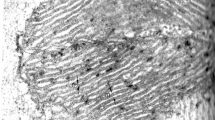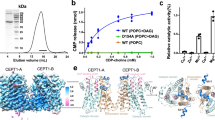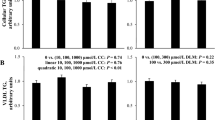Abstract
THE lipotropic effect of choline has been interpreted most generally by assuming that fatty acids are carried out of the liver in the form of plasma phospholipides. However, the role of these compounds in the transport of fatty acids has been questioned1. The results presented here strongly suggest that choline acts by enhancing the oxidation of fatty acids in the liver.
This is a preview of subscription content, access via your institution
Access options
Subscribe to this journal
Receive 51 print issues and online access
$199.00 per year
only $3.90 per issue
Buy this article
- Purchase on Springer Link
- Instant access to full article PDF
Prices may be subject to local taxes which are calculated during checkout
Similar content being viewed by others
References
Entenman, C., Chaikoff, I. L., and Zilversmit, D. B., J. Biol. Chem., 166, 15 (1946). Zilversmit, D. B., Entenman, C., and Chaikoff, I. L., J. Biol. Chem., 176, 193 (1948).
Artom, C., and Cornatzer, W. E., J. Biol. Chem., 171, 797 (1947).
Weinhouse, S., Millington, R. H., and Volk, M. E., J. Biol. Chem., 185, 191 (1950).
See also, in this respect, Abdon, N. O., and Börglin, N. E., Acta Pharmacol. Toxicol., 3, 73 (1947).
Author information
Authors and Affiliations
Rights and permissions
About this article
Cite this article
ARTOM, C. Role of Choline in the Oxidation of Fatty Acids by the Isolated Liver. Nature 171, 347–348 (1953). https://doi.org/10.1038/171347b0
Issue Date:
DOI: https://doi.org/10.1038/171347b0
Comments
By submitting a comment you agree to abide by our Terms and Community Guidelines. If you find something abusive or that does not comply with our terms or guidelines please flag it as inappropriate.



